Working with chimpanzees leads most people to think A LOT about humans. It’s so easy to see us in them and them in us because they are our closest living relatives. We share most of our DNA with them.
Many of our physical characteristics are the same, like our hands.
We watch chimpanzees and are buoyed by the love, compassion, and empathy that they exhibit on a daily basis, and sometimes curiously confused by their interactions. I will give you one example from the other day.
On Saturday, we were bracing for a big storm. There were warnings of thunder, lightening, hail, massive rainstorms, and strong winds. The storm didn’t turn out to be as dramatic in Cle Elum as elsewhere, but the sky started to look very ominous right around the chimps’ dinnertime. Kelsi went to serve dinner to the group of seven chimpanzees while I tried to close off the playroom to spot clean.
Suddenly, there was repeated and rather deafening alarm calls coming from the other side of the building. I went to check on things and found Mave looking out the window towards the valley below, emitting her loud vocal warnings. I don’t know what she saw, but I suspect it was lightening.
Kelsi was unable to convince Jody and Missy to go to the greenhouse for their dinner because they did not want to leave the common wall that the playroom shares with Mave’s rooms. They were visibly concerned about Mave’s vocalizations. Maybe they were concerned for Mave herself (I would bet this was the case for Jody) or maybe they were concerned that whatever Mave was clearly very anxious about was something they should be fearful of as well.
I gave up trying to close off the playroom and instead brought Honey B, Willy B, and Mave their dinner to the top floor of their housing, the area we refer to as the mezzanine. Mave continued her plaintive cries while Willy B and Honey B ignored her and waited for me to serve them dinner, which I did.
I also gave Mave some food, hoping that maybe sweet potato, carrots, and night bags would serve as a distraction to the imminent danger she seemed to be feeling. She did something I’ve never seen another chimpanzee do before; she took the food and continued to loudly alarm call in-between biting and swallowing.
Though I was amused by Mave’s ability to multi-task, I was distressed listening to her persistent calls. Honey B and Willy B, however, proceeded to ignore her. Perhaps they’ve seen Mave overreact before. Maybe they just really aren’t that empathetic – empathy is certainly a variable trait. Perhaps the sweet potatoes were just that good. Or maybe they just didn’t know what to do, so thought it was better to pretend that nothing was happening. After twenty minutes or so, Mave, though still acting wary and looking out the window, finally ceased alarm calling.
We see so much variability in personality across the chimpanzees, and we see the wide range of emotions that they are capable of as individuals and a species.
We understand, for example, that they can be incredibly violent. They can lash out at one another in an instant out of fear, insecurity, or even as a calculated method of obtaining or preserving power or gaining access to resources. We can see all of this and recognize that humans are no different. Some of us may have a shorter fuse than others, but we are all capable of horrific acts of aggression and unfathomable indifference. Like chimpanzees, violence is a small part of our lives as a whole, but it’s there. It’s part of our DNA, as they say.
Being very social primates, chimpanzees and humans not only can but need to form tight bonds with one another; this is how we survive in the literal sense and thrive as emotional beings even in our modern day existence.
Unfortunately, there is another side to forming tight social bonds, and that is seeing those outside of our social group as not-us, as others, as enemies.
Before I began working with chimpanzee Washoe and her family in 1998, I marveled at a story that Roger Fouts wrote about in the book Next of Kin. Washoe, who had been enculturated into a human environment and taught the signs of American sign language, did not meet another chimpanzee until she was five years old. When she was moved to a facility with other chimpanzees and woke up in a cage next to them, she was asked in sign language what they were and she called the other chimpanzees, “black bugs” and “black cats” – neither of which she liked at all.
Washoe eventually learned to accept her chimpanzee-ness and became the matriarch of a group of five. By the time I met her she was well versed in chimpanzee behavior and was more likely to dismiss the clearly inferior humans (myself included) than her adopted chimpanzee family members.
At least in part because of the influence of Dr. Fouts, I’ve long struggled with the idea that humans sit comfortably outside of the animal kingdom with a huge gulf between “us” and all of the other animals living and extinct. It’s not a very biologically sound view of our existence.
Far more academic people than myself have argued for years about the salient qualities that do separate us from our primate cousins. Some behaviors that scholars pointed to as elevating humans above other animals, like tool use, were shot down years ago, with more and more evidence recorded of non-humans using and adapting tools as times goes by.
There is something, however, that I think does distinguish humans as a species, at least until evidence is uncovered about the mysteries of animal communication. It’s what I’m doing right now – storytelling. Storytelling and the ability to record and share information across generations has dramatically changed how we go about living and how we interact with the world at large.
Combining our biological capacity to empathize and bond with others and our knack for storytelling, we humans should have an incredible leg-up on other species in how we view and treat one another. But this doesn’t seem to be the case. In fact, I think it’s possible our storytelling abilities might just be the end of us. Humans can and do use this communicative talent to rationalize or re-frame what we otherwise should collectively view as outrageous and unjust behavior.
With stories we can organize, expand, and amplify “us” and “them” groupings and allow our self- and group-protective instincts to vilify anyone who differs from the group we identify with, whether that identity is tied to our genealogy, geography, educational attainment, the amount of pigment in our skin, or any number of beliefs and preferences or arbitrary physical characteristics.
As a species we are experiencing a tragic period in our history. I don’t know anyone who hasn’t felt overwhelmed by sadness, anger, and anxiety these past few months. It would be wonderful if we could turn towards the positive aspects of being social primates. It would be great if we could really listen to each others stories. It would be amazing if we could all remember to recognize that our empathy needs to stretch far beyond our personal lived experience.
I am incredibly saddened by the violence inflicted on George Floyd in Minnesota and the fact that he is one in a long line of black people who have been viewed and treated as “them” by white people in power. I am glad that the story of his death is being told across the world.
I would like to believe that we as a species are on a trajectory of widening the narrow view of “us” that we individually hold onto to include beings that I can’t even imagine, but we have a really long way to go.
For today, I just hope we can figure out a way to understand and embrace our own collective humanity.
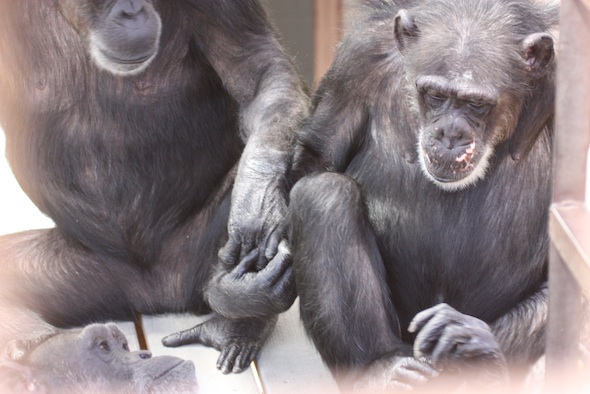
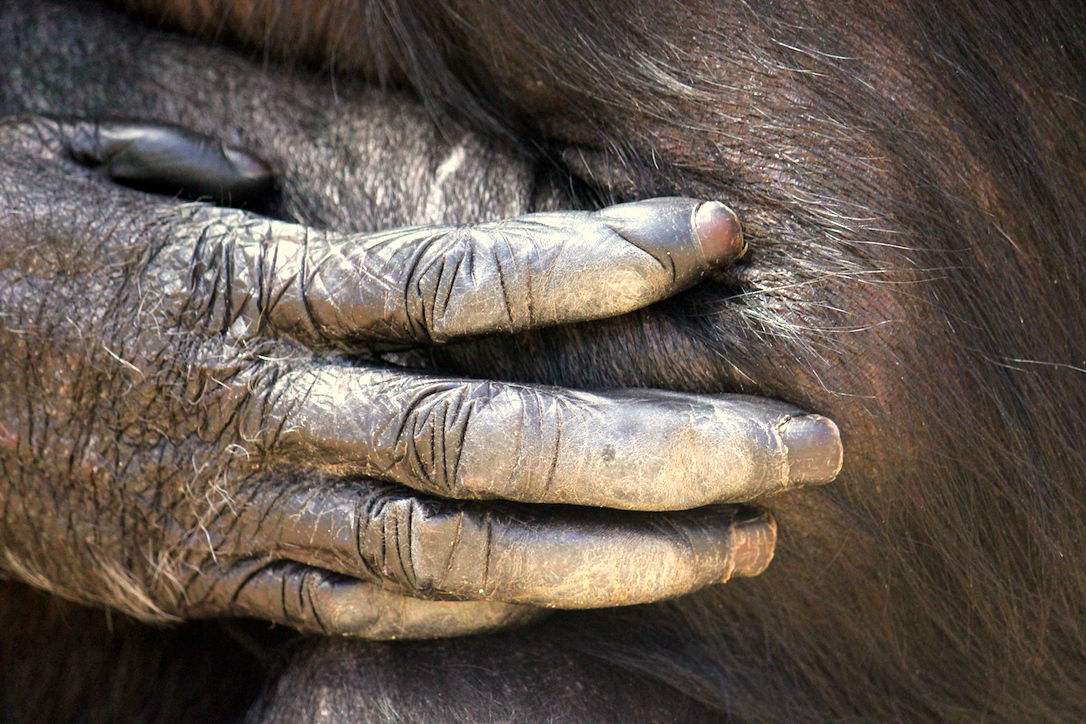
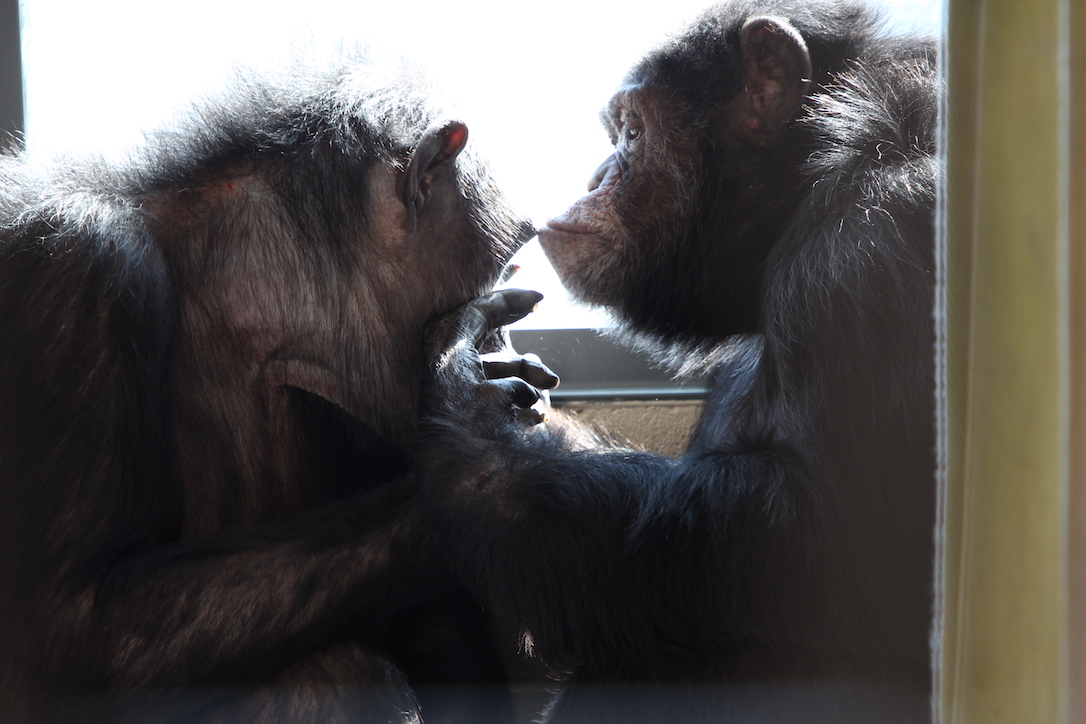
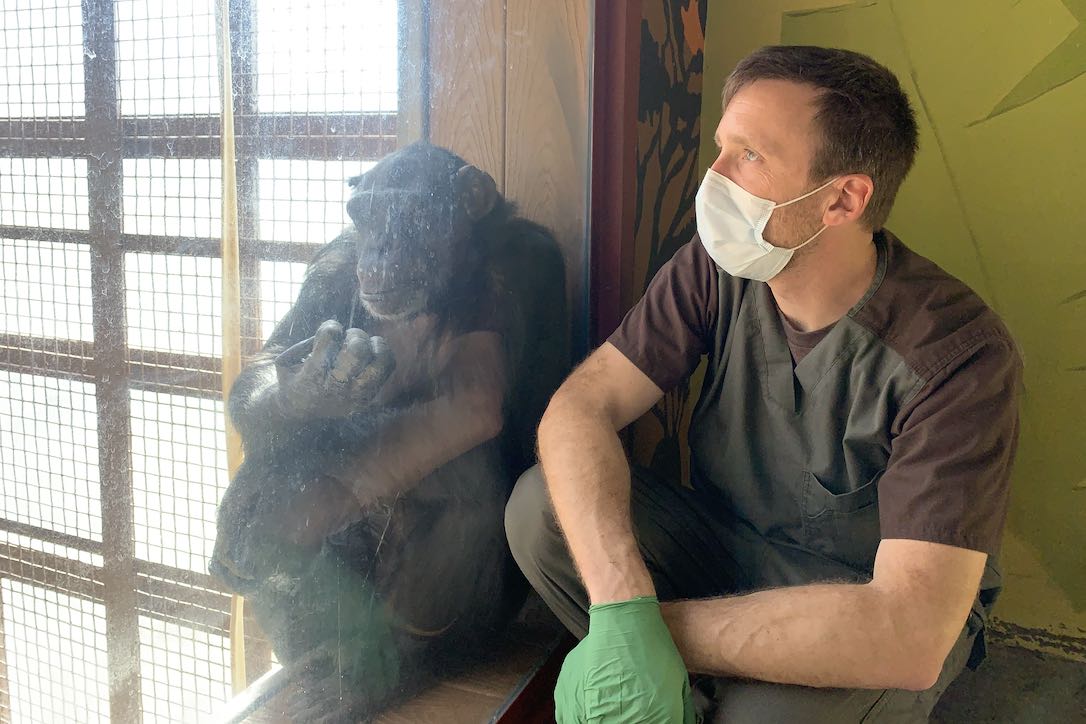




Beautiful!! Thank you so much!! Love and hugs to you all…
Amen, sister.
Thanks, Diana. 🙂
Is J.B. sitting by Washoe?
Washoe was from an earlier time. Around 1989. This is one of the 7. Look at the blog from a few weeks ago.
that’s Jamie, self-appointed “Boss” of he sanctuary. At least, of the 7. There’s a video of the moment on YouTube.
Others who responded are correct. That’s Jamie on the other side of the window from J.B. Washoe lived at Central Washington University, which is where I met her, until her death in 2007. There is a statue of her in Ellensburg.
Thank you for this thoughtful post. We are indeed engulfed in sadness of man’s inhumanity to man, and wondering how we will get through it all. We can only hope and pray that lightness of love will prevail over the darkness of hate.
So true, Cara
Very thoughtful. Thank you so much, Diana.
Thank you for the thoughtful words! Beautifully written.
Praying for PEACE!
Beautiful and thought-provoking blog. Well done ?
Diana, I can only echo all the praise above. Brilliant, simply brilliant. Thank you.
Best.Post.Ever. Thank you, Diana. (((virtual hugs)))
Well said Diana.
Well spoken, Diana. A lot of words are being thrown around these days but I found your comments to be ‘right on’. And loved the photo of Jamie and JB sitting side-by-side. I can see there is a glass between them but it made me wonder how Jane Goodall was able to sit right next to the animals she loved during her years of research. I remember a very touching photo of a chimp being release and before he ran off into the forest, he jumped on his travelling box, put his arms around her and hugged and kissed her as if to say THANK YOU. She wasn’t afraid at all.
Thank you Elaine! Working with chimpanzees in captivity is a different experience than observing them in the wild, for sure! That video you mentioned is very touching.
Beautifully stated. Thank you so much!
Debbie Printy
So very poignant. Thank you Diana.
So well said Diana. Thank you very much for your blog. It made my day to read your thoughts and to understand that I feel the same way as you do. I hope others will embrace this wider view of “us” as well–the sooner, the better.
Thank you, everyone. I’m not very satisfied with this post. The issues are immense and so many people are suffering. I want to respect that pain. It’s difficult to know whether my jumbled thoughts, from my privileged position, are appropriate to share right now. I do appreciate your kind comments.
Wonderful post Diana…hopefully more eyes will open in harmony… Thank you.. as always. Hugs to all!